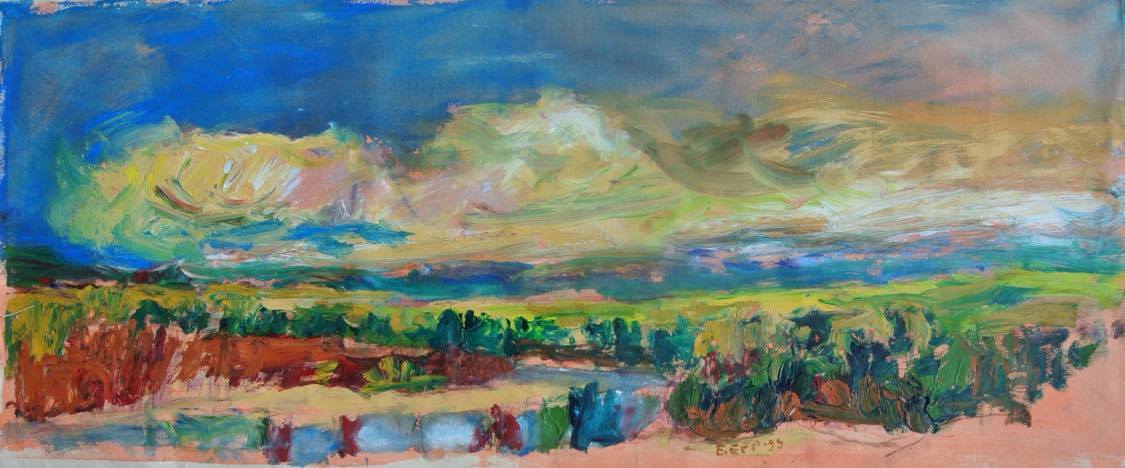
Kalum River View, acrylic on canvas, by Edward Epp, 1997
The Day-Star of Blissfulness
by KATHRYN BARLOW
In the name of Him Who hath cast His splendour over the entire creation!
The Divine Springtime is come, O Most Exalted Pen, for the Festival of the All-Merciful is fast approaching. Bestir thyself, and magnify, before the entire creation, the name of God, and celebrate His praise, in such wise that all created things may be regenerated and made new. Speak, and hold not thy peace. The day-star of blissfulness shineth above the horizon of Our name, the Blissful, inasmuch as the kingdom of the names of God hath been adorned with the ornament of the name of thy Lord, the Creator of the heavens. Arise before the nations of the earth, and arm thyself with the power of this Most Great Name, and be not of those who tarry.
— Gleanings from the Writings of Bahá’u’lláh, XIV
In the Tablet of Ridvan (Lawh-i-Ridvan), Bahá’u’lláh invites us to be present at the very moment He receives God’s command to announce His Revelation to the world. In the opening lines of this passage, we witness the first stirrings of life in the spiritual world; and notwithstanding our inability to comprehend it fully, we glimpse something of Bahá’u’lláh’s station in that world, a station which cannot be described but only evoked as a condition of bliss.
A tone of joyous anticipation is evident even in the invocation, which is exclamatory in nature: God has “cast His splendour over the entire creation!” As the shining golden luster of a chrysalis breaks open against the wings of the emerging butterfly, so do all created things shimmer with the resplendence of God and ready themselves to “be regenerated and made new.”
The “Divine Springtime” has come, and with it, a joyous festival — the “Festival of the All-Merciful.” Being “Divine” in nature this springtime is a time of spiritual growth, but, nonetheless, it has its correlative in the physical world; and it seems fitting that the “Festival of the All-Merciful.” The linking of the “Divine Springtime” coincides with a time of renewal in the natural world. That this, the Most Great Festival, Ridvan, is linked with this Name of God, the “All-Merciful” underlines the incalculable bounty Bahá’u’lláh’s Revelation bestows upon humanity.
As the nascent revelation is set in motion, the transformation promised by the “Divine Springtime” will come. God enjoins Bahá’u’lláh to “[b]estir” Himself, to “magnify ... the name of God,” to “celebrate [God’s] praise,” to “[s]peak,” to “hold not [His] peace,” to “[a]rise,” to “arm” Himself and to not to “tarry.” But accomplishing these tasks will not be easy. The adverbials suggest something of the daunting and formidable nature of the mission before Bahá’u’lláh who must “magnify, before the entire creation, the name of God.” It is not enough for Him to worship God privately: He must celebrate God’s praise “in such wise that all created things may be regenerated and made new.” Bahá’u’lláh must “[a]rise before the nations of the earth” and “arm” Himself “with the power of this Most Great Name,” a name which will empower Him to accomplish His mission and protect Him as He does so.
In the opening sentence of this passage, the invocation, God addresses Bahá’u’lláh with a vocative followed by the title that suggests His role as the Author of human existence in this day: “O Most Exalted Pen.” The metaphor serves to convey something of Bahá’u’lláh’s supreme position, of God’s great love for Him, and also of His own subordination to God’s will. By speaking with the voice of God, Bahá’u’lláh makes clear to us, the readers of this tablet, that our relationship with Him as the messenger of God is a reflection of His own relationship with the Godhead. We must subordinate our will to His. And how better to “magnify God’s name” and praise Him in such a way “that all created things may be regenerated and made new,” than to make us, His human creatures, aware of His glory?
A pen is an inert instrument; it needs an agent to make it useful. The metaphor underlines that Bahá’u’lláh serves as a channel through which God communicates with humanity. Bahá’u’lláh’s words are the Word of God. A finely crafted pen can have intrinsic aesthetic value but God addresses Bahá’u’lláh as the “Most Exalted Pen.” Bahá’u’lláh, therefore, is not just any elegant pen; indeed, He is not a “pen” at all, but the “Pen” — a living, breathing Pen, the finest Pen imaginable, an instrument that God cherishes greatly.
The spiritual world in which God’s great love for Bahá’u’lláh is expressed lies far beyond our experience and understanding. Bahá’u’lláh writes: “The day-star of blissfulness shineth above the horizon of Our Name, the Blissful, inasmuch as the kingdom of the names of God hath been adorned with the ornament of the name of thy Lord, the Creator of the heavens.” This assertion may be divided into two parts: the cause — “inasmuch as the kingdom of the names of God hath been adorned with the ornament of the name of thy Lord, the Creator of the heavens” — and the effect — “The day-star of blissfulness shineth above the horizon of Our Name, the Blissful.”
The “kingdom of the names of God” is impossible for us to conceive of. While we know what a kingdom is — a territory subject to a king — knowledge of the organization and the structure of the “kingdom of the names of God” is beyond our human comprehension. However, we can imagine God as a king. Despite our powerlessness to visualize the spiritual realm, we read that this realm bears an “ornament” that enhances its wealth, that ornament being the “name of thy Lord.” But who is this Lord? A lord may be a master or a ruler, but he is not a king, so we conclude that this Lord is not God Himself; rather the vocative “thy Lord” is used to emphasize Bahá’u’lláh’s own nobility. Moreover, “thy Lord” is also “the Creator of the heavens.” Thus we can surmise that Bahá’u’lláh is “the Creator of the heavens” of the new Dispensation in which “the day-star of blissfulness” shines.
The addition of Bahá’u’lláh’s name to the “kingdom of the names of God” subsequent to His declaration, generates such joy that the “day-star of blissfulness” rises above “the horizon of [God’s] Name, the Blissful.” The “day-star of blissfulness” may be likened to a solar prominence, the kind of luminous spot of plasma that sometimes appears above the glowing surface of the sun. Perhaps a fragment of “Our Name, the Blissful” has formed the “day-star of blissfulness” above the “horizon” of God’s Name, the Blissful?
By rising above this horizon, the “day-star of blissfulness” has breached the boundary between the purely spiritual world, which is comprised of the Names of God and the physical world we inhabit. A ray of this bliss now touches us, giving us the capacity to transcend the physical world and lose ourselves in spiritual ecstasy, even though the form of bliss we experience may be far removed from that generated by the “day-star of blissfulness” as it rises above the “horizon of God’s name, the Blissful.” How far our ecstatic experience of bliss is from the “Name of God, the Blissful,” and indeed, from any name in “the kingdom of the names of God,” never mind from the King, Himself!
While we cannot fully grasp the significance of this metaphor, we may feel elated pondering it. Even so, we must not lose ourselves in yearning for spiritual realms that are inaccessible to us. We must remember God’s call to Bahá’u’lláh: “Bestir thyself, and magnify, before the entire creation, the name of God, and celebrate His praise, in such wise that all created things may be regenerated and made new. Speak, and hold not thy peace.” In pondering this call, we glimpse something of the joy, even ecstasy, we may derive from recognition of and obedience to the new Manifestation. And we, in turn, must ponder, the call to service implied by God’s command to Bahá’u’lláh: “Arise, before the nations of the earth, and arm thyself with the power of this Most Great Name, and be not of those who tarry.” Action is essential.
In this uplifting introductory passage from the Tablet of Ridvan, Bahá’u’lláh prepares us for His joyous Declaration by demonstrating both His humility before God and His supreme position as God’s “Pen.” He revivifies our souls with tidings of great joy and opens the door to new spiritual realms as He invites us to celebrate the “Divine Springtime” during the “Festival of the All-Merciful” — Ridvan.

Kathryn Barlow

